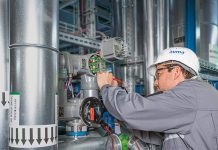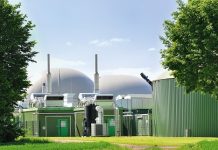MP Andrew Jones and Leader of Harrogate Council Richard Cooper joined Yorkshire Water engineers on a routine blockage inspection of the town’s sewers. The event was held before the General Election was announced.
Harrogate is a sewer blockage hotspot with almost 200 blockages being cleared from its sewers over the past two years.
The main culprit is ‘flushable’ wet wipes as they don’t disintegrate once flushed and can build up once they enter the sewer network to cause a blockage. The blockages can flood people’s homes and gardens, and even result in local becks and rivers being polluted.
The MP and Cllr Cooper joined Network Engineers Oliver Escreet and Andy Dignam who hunt for blockages in Yorkshire’s sewer network and help keep it maintained. The visit involved putting a CCTV camera down the sewer to see if there were any blockages and check for any defects.
Yorkshire Water recently announced that they will be spending £1.1 million on a new specialist team to help keep the region’s sewers clear. The 22-strong team will have more than a dozen vehicles at its disposal, to unblock sewers by jetting them with high pressure water sprays or using suction pumps.
Lee Pitcher, Head of Waste Water Services at Yorkshire Water said: “The sewers of Harrogate have been getting blocked up with all sorts; flushable wet wipes, thick toilet paper, fat, sanitary items, bricks and even a plank of wood.
“However, we can’t keep an eye on everything that goes in our sewers and that’s why we’re asking residents to help us keep them running clear and blockage free to reduce pollution and flooding incidents.”
Andrew Jones, attending as MP for Harrogate and Knaresborough, said: “After seeing how small sewers actually are its inevitable that wet wipes and other unflushable items could cause a serious problem very quickly if they build up. We can all play our part to help protect our homes, gardens and the local environment by not flushing wet wipes, sanitary items and rubbish down the loo.”





